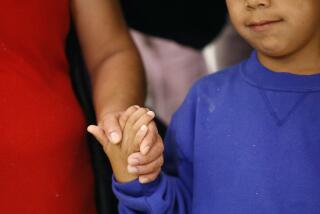Book Review : Fragility of the Parent-Child Connection
A Boy Like Astrid’s Mother by Mae Briskin (W.W. Norton: $16.95; 194 pages)
Related by Mae Briskin’s acute vision and intimate knowledge of her themes, these unforgettable stories move gracefully from here and now to there and then. In the title piece, a suburban woman’s attention is caught by a newspaper picture of a missing girl, accompanied by a plea to call home. “It was summer’s end 1972, a time of runaway children.”
Surprisingly, it isn’t the smiling child whose image haunts the narrator, but the unseen, sorrowful face of the mother, tormented by guilt and anxiety, who could so easily be the storyteller herself. A few weeks later, the writer hires a high school student to help in her garden; a solemn, hard-working boy who at first seems curiously remote, but soon blurts out the information that he lives alone in a rented room. He’s a “throwaway” child, another phenomenon of the time. At the writer’s gentle prodding, he explains that his mother’s second husband never bargained for a teen-aged stepson and his father thinks 17 is old enough to shift for oneself.
Despite her misgivings, her husband’s objections and the inevitable difficulties with their own son, she allows the boy to move into their spare room. The arrangement soon shatters their tranquillity, exposing the precariousness of even the most stable family relationship, and ends in a violent confrontation between the two boys--the one loved by his parents, the other not, but with more in common than one might at first suspect.
A Bond Strained and Tested
One way and another, the 11 stories in the first section of the book explore the terrible fragility of connections between parents and children; a bond strained and tested virtually from birth. “Preservation” offers a different facet of life in the ‘70s. Scofield is the son of one of the narrator’s friends, a talented child and charming adolescent who abruptly became a heroin addict. Now he’s been seen panhandling downtown, giving a street corner as his address.
Motivated by a complex mixture of affection, identification, and the need to understand, this narrator tracks her friend’s son down to the derelict house where he’s a squatter. In no more than 2,500 words, Briskin plumbs the depth of a contemporary mystery. “Scofield, why?” she asks, eliciting an answer that strikes terror into her heart.
Wryly Hilarious
“The Kid” looks at adolescent desperation from still another vantage point. This time the narrator is a father, thinking back to the events that preceded his boy’s mental breakdown, a process culminating in an attempt to take a hostage at gunpoint in the college library. Obviously, the father ignored the early warning signals, and now, a sad, aging man 10 years after the fact, he wonders “if there is still a place for him in Mark’s life, any place at all, and whether he should even expect there to be such a place.”
In “Giant Sequoia,” a liberated Northern California couple entertain the wife’s Eastern parents, who have “entrusted their plants to their friends but brought their neuroses, which they think they hide from us in innocent questions.” Unlike the other stories in the section, “Giant Sequoia” is wryly hilarious, the tension, hostility and mutual love juggled like ninepins, kept aloft by absolute command of the material.
“Two Women, One Child” skips a generation to provide a fresh perspective on the parent-child dilemma. A grandmother has cared lovingly for her footloose granddaughter’s baby while the young mother rockets around the country in search of herself. The story recounts the grandmother’s anguish on the day the girl returns with her newest lover to pick up the child, as casually as if she were collecting mail held at the post office.
The last pieces are a set of stunningly powerful and delicate stories set in Italy during World War II; each one examining the courage of ordinary Italians who risked their own lives to hide refugees. Though Italy at first refused to relinquish its Jews to the Nazis, in the final months of the war, the Germans overcame Italian resistance and seized the fugitives and those who had sheltered them.
Briskin has turned four such incidents into exquisitely wrought tales tallying the emotional cost of these individual acts, stories that not only astonish the reader with their technical sophistication, but restore his flagging faith in humanity. There’s not much more one can ask of any book.
More to Read
Sign up for our Book Club newsletter
Get the latest news, events and more from the Los Angeles Times Book Club, and help us get L.A. reading and talking.
You may occasionally receive promotional content from the Los Angeles Times.







